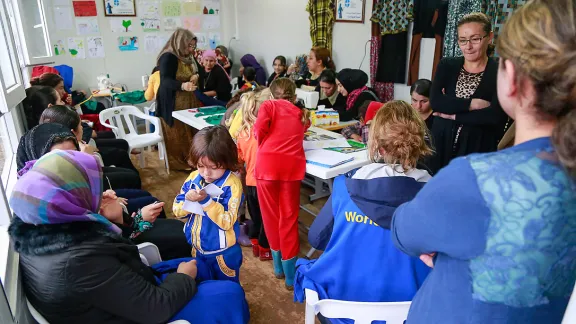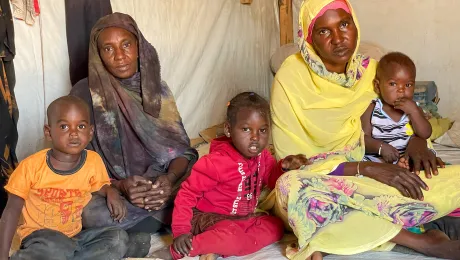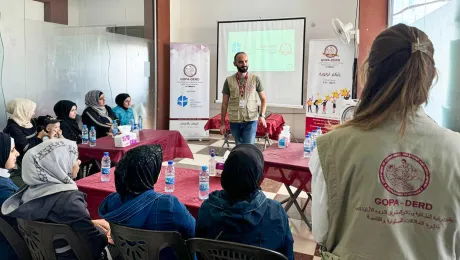
Women-friendly space in Davudiya refugee camp, Northern Iraq. Photo: LWF/ Seivan Salim
(LWI) – “We are six people in our tent,” Sory Rasno, 40, says. “At night the wind keeps us awake. There is no privacy, no space. The children start school this year, but they have no place to study. Here we can forget some of our problems.”
“Here” are two containers, marginally bigger than the space that Rasno’s family has in their tent in Esyan camp for internally displaced people (IDP) in Northern Iraq. “Internally displaced” is the official term for the Yazidis, Shia and Christians who have become refugees in their own country when the so-called Islamic State militia drove them from their home towns.
Escape from camp life
The Lutheran World Federation has set up nine “Women-friendly spaces” in various camps in northern Iraq. They give women, who traditionally do not speak in public in these communities, a forum and protected space to meet. Often this is no more than a container or two, sometimes surrounded by a fence. There is little space and often 20 or more people are crammed inside one of the provisional bungalows. Young girls sit on plastic chairs along the wall, knitting. In the middle, a young woman demonstrates on a girl how to twist her hair into an elaborate hairdo. In the other container, elderly women are gathered around sewing machines and discuss patterns for dresses and blouses.
For Sory Rasno and the other women and girls who come here however, it is an escape from camp life. “We meet new friends, and we learn handcrafts and many other things,” Rasno explains. “We are free to do what we like here.” To illustrate that, she shows a drawing: A cross and a Yazidi temple. In the tent she shares with her family, she would have had neither the time nor the space for such a leisure activity.
“Before we started the center, the women were stuck in the tents with nowhere to go,” Nadia Brahim Morad, who supervises one of the centers for the LWF, says. “They were depressed and very emotional.” When the so-called Islamic State advanced in Northern Iraq, the Yazidi, Shia and Christians now gathered in the camp had to leave their homes. What little they had packed was often taken; many experienced or witnessed unspeakable acts of violence. The people in the camp are traumatized, by previous experience as much as their current situation and an uncertain future.
I feel happy because whatever we faced in the past, we still live and laugh together.
The unofficial camp forum
The women-friendly spaces are set up to provide distraction and a place to learn new skills. There are sewing and hairdressing workshops, literacy classes, games and arts sessions. “The women sometimes bring their children, and they also teach to them what they learn here,” Morad says.
Women-friendly spaces can also be a facilitator of social cohesion in the camp set-up which can often be difficult. This becomes visible when visiting Davudia camp, the northernmost of the IDP settlements in Dohuk. It is one of the few camps where people of four different faiths are housed: Christians, Yazidis, Shia and Turkmen live together in close vicinity, yet separate quarters and communities.
It’s in the women-friendly spaces where the different groups come together. On a typical afternoon almost 30 women and children gather in the bungalow. The children draw pictures, while the women talk and take turns on the sewing machine. The windows are foggy where the breath of many people has condensed; the floor is covered in the mud of many boots. This is the place where faiths, cultures and life stories meet.
An impromptu language class has already come out of these meetings – the Kurdish-speaking Yazidis teach the Arabic-speaking Christians their language and vice versa. “We are now living in an area where everyone speaks Kurdish,” Haifa Khelaf, a Christian, says. “So we should learn the language.” For many Kurds, Arabic is the language spoken by the Iraqi dictator Sadam Hussein who persecuted the Kurds in the north, her friend Wafaa Marana Monzu explains.
Among the refugees with their different backgrounds, however, this issue has been resolved for now. “I feel happy because whatever we faced in the past, we still live and laugh together,” Wafaa Marana Monzu says.
The LWF runs nine women-friendly spaces in camps in northern Iraq. Together with a local partner, the Jiyan Foundation, LWF provides counseling and psychosocial support to 2,000 traumatized women and girls.


